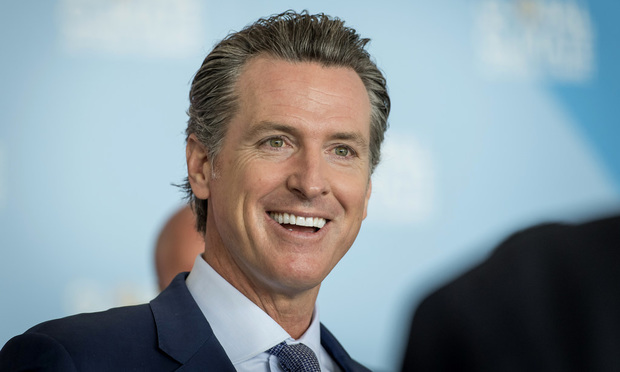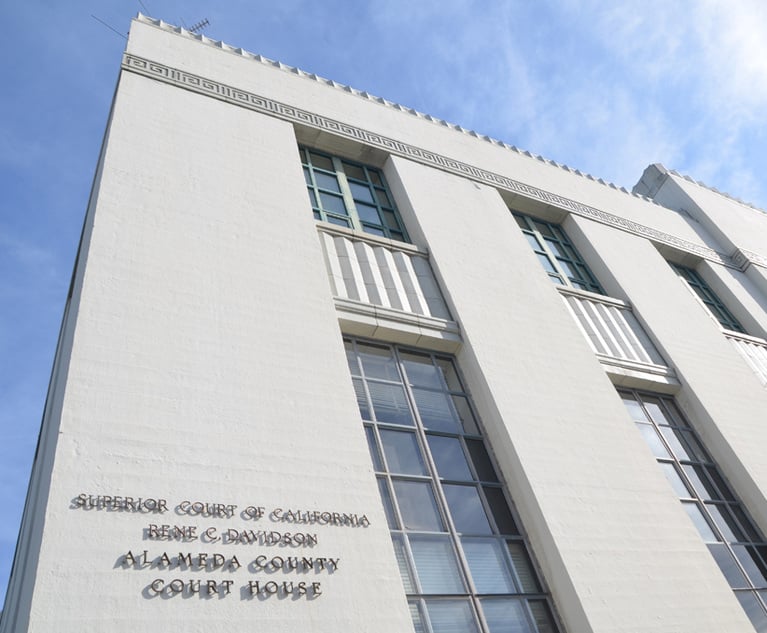Judiciary Poised to Receive $2B in Courthouse Upgrades Under California Budget
The governor's $222.2 billion proposed budget includes money for a court navigator program for unrepresented litigants in state courts, a program Chief Justice Tani Cantil-Sakauye initially called for in her 2018 State of the Judiciary Address.
January 10, 2020 at 05:57 PM
3 minute read
 California Gov. Gavin Newsom. Photographer: David Paul Morris/Bloomberg
California Gov. Gavin Newsom. Photographer: David Paul Morris/Bloomberg
California's state judiciary stands to continue receiving incremental funding increases under the budget proposal unveiled Friday by Gov. Gavin Newsom.
The governor's $222.2 billion proposed budget includes $4.3 billion for the judicial branch with more money designated for technology projects and long-term priorities flagged by court officials, including a portion of the courthouse construction projects identified by the Judicial Council and a court navigator program for unrepresented litigants in state courts, a program Chief Justice Tani Cantil-Sakauye initially called for in her 2018 State of the Judiciary Address.
The program, which is set to get $8.1 million in 2020-21 and $15.5 million annually thereafter, would add court navigators at trial courts to help unrepresented individuals, including victims, witnesses, and family court petitioners, navigate the complexities of the court system.
"We are grateful for Governor Newsom's budget proposal. It is welcome news for our residents, who rely on a fair, just, and accessible court system," the chief justice said in a statement that specifically noted the budget's inclusion of the court navigator program. "This kind of program will assist millions of our court users in understanding and following court processes," she said.
The budget includes $2 billion for court construction projects, which assumes that about five projects from the list of 80 projects identified and ranked by the Judicial Council will be started each year for the next five years. The Judicial Council ranked the projects, which include both new construction and renovation projects in 41 of the state's 58 trial courts, based on need and cost. The administration said it expects to propose the first of the projects this spring. The total cost of all 80 projects is estimated at $13.2 billion.
The budget also includes $10.3 million in 2020-21 and $2.8 million going forward for information technology modernization projects to convert static court forms into an electronic data-driven format; to develop a virtual case management system to allow interfacing between individual court case management systems; and to create "next-generation data centers and cloud-based solutions."
The budget also provides for an expansion of a program that ties fines and court fees to the ability to pay. Four courts have implemented a pilot program to cut fines and fees for those eligible by about 50% and allow them to make payments in installments. The budget includes $11.5 million in 2020-21, increasing to $56 million by 2023-24, to expand the program statewide for both traffic and nontraffic violations. The ongoing $56 million in costs include $2 million to put an online application system in place for the program and $54 million to backfill the estimated loss in revenue to the courts from the lowered fees and fines.
This content has been archived. It is available through our partners, LexisNexis® and Bloomberg Law.
To view this content, please continue to their sites.
Not a Lexis Subscriber?
Subscribe Now
Not a Bloomberg Law Subscriber?
Subscribe Now
NOT FOR REPRINT
© 2025 ALM Global, LLC, All Rights Reserved. Request academic re-use from www.copyright.com. All other uses, submit a request to [email protected]. For more information visit Asset & Logo Licensing.
You Might Like
View All

Fresh lawsuit hits Oregon city at the heart of Supreme Court ruling on homeless encampments
4 minute read

Trending Stories
- 128 Firms Supporting Retired Barnes & Thornburg Litigator in Georgia Supreme Court Malpractice Case
- 2Boosting Litigation and Employee Benefits Practices, Two Am Law 100 Firms Grow in Pittsburgh
- 3EMT Qualifies as 'Health Care Provider' Under Whistleblower Act, State Appellate Court Rules
- 4Bar Report - Feb. 3
- 5Was $1.3M in 'Incentive' Payments Commission? NJ Justices Weigh Arguments
Who Got The Work
J. Brugh Lower of Gibbons has entered an appearance for industrial equipment supplier Devco Corporation in a pending trademark infringement lawsuit. The suit, accusing the defendant of selling knock-off Graco products, was filed Dec. 18 in New Jersey District Court by Rivkin Radler on behalf of Graco Inc. and Graco Minnesota. The case, assigned to U.S. District Judge Zahid N. Quraishi, is 3:24-cv-11294, Graco Inc. et al v. Devco Corporation.
Who Got The Work
Rebecca Maller-Stein and Kent A. Yalowitz of Arnold & Porter Kaye Scholer have entered their appearances for Hanaco Venture Capital and its executives, Lior Prosor and David Frankel, in a pending securities lawsuit. The action, filed on Dec. 24 in New York Southern District Court by Zell, Aron & Co. on behalf of Goldeneye Advisors, accuses the defendants of negligently and fraudulently managing the plaintiff's $1 million investment. The case, assigned to U.S. District Judge Vernon S. Broderick, is 1:24-cv-09918, Goldeneye Advisors, LLC v. Hanaco Venture Capital, Ltd. et al.
Who Got The Work
Attorneys from A&O Shearman has stepped in as defense counsel for Toronto-Dominion Bank and other defendants in a pending securities class action. The suit, filed Dec. 11 in New York Southern District Court by Bleichmar Fonti & Auld, accuses the defendants of concealing the bank's 'pervasive' deficiencies in regards to its compliance with the Bank Secrecy Act and the quality of its anti-money laundering controls. The case, assigned to U.S. District Judge Arun Subramanian, is 1:24-cv-09445, Gonzalez v. The Toronto-Dominion Bank et al.
Who Got The Work
Crown Castle International, a Pennsylvania company providing shared communications infrastructure, has turned to Luke D. Wolf of Gordon Rees Scully Mansukhani to fend off a pending breach-of-contract lawsuit. The court action, filed Nov. 25 in Michigan Eastern District Court by Hooper Hathaway PC on behalf of The Town Residences LLC, accuses Crown Castle of failing to transfer approximately $30,000 in utility payments from T-Mobile in breach of a roof-top lease and assignment agreement. The case, assigned to U.S. District Judge Susan K. Declercq, is 2:24-cv-13131, The Town Residences LLC v. T-Mobile US, Inc. et al.
Who Got The Work
Wilfred P. Coronato and Daniel M. Schwartz of McCarter & English have stepped in as defense counsel to Electrolux Home Products Inc. in a pending product liability lawsuit. The court action, filed Nov. 26 in New York Eastern District Court by Poulos Lopiccolo PC and Nagel Rice LLP on behalf of David Stern, alleges that the defendant's refrigerators’ drawers and shelving repeatedly break and fall apart within months after purchase. The case, assigned to U.S. District Judge Joan M. Azrack, is 2:24-cv-08204, Stern v. Electrolux Home Products, Inc.
Featured Firms
Law Offices of Gary Martin Hays & Associates, P.C.
(470) 294-1674
Law Offices of Mark E. Salomone
(857) 444-6468
Smith & Hassler
(713) 739-1250






